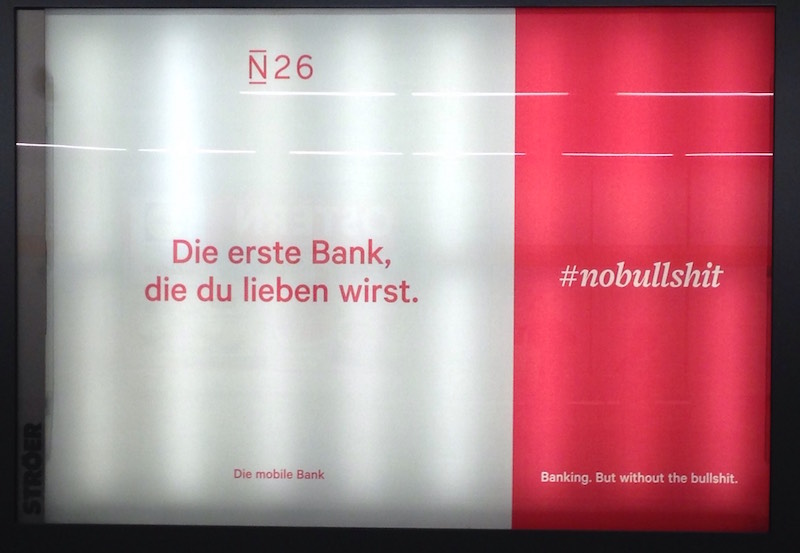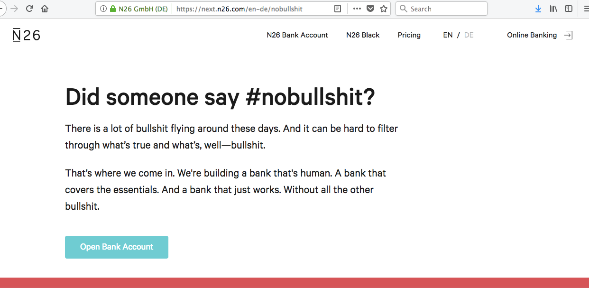#nobullshit bank
« previous post | next post »
From Josh Penney:
Josh remarks (translations from German to English are by VHM):
I thought you might be interested in these photos from an advertising campaign for a mobile based bank, N26, which have been appearing around Germany recently, as I know you have discussed similar things on Language Log in the past (the big fuckin' sale post from a few years back comes to mind). These were all taken on train stations in Munich, Germany (there are also a couple more variants I've seen but not been quick enough to snap; you can probably find them online I guess) and all have the catchprase #nobullshit. And here is a screen shot of the bank's website, written in English and also with the no bullshit tag.
I'm not sure how much tolerance there would be in the US for such a campaign, but I doubt very much that this would be allowed in Australia (I presume this would also be the case in other English speaking countries such as the UK or New Zealand). I suppose that in Germany it may not be as controversial due to the fact that English is an L2 for most people and hence they lack the sensitivity that L1 speakers would feel for such taboo words. Or perhaps Germans are more comfortable with this due to the fact that Scheiße, the direct translation of shit in German, does not have such a strong sense of taboo attached to it these days as shit does in English. For example, the catchphrase of the German children's show Wissen macht Ah! ("Knowledge makes Ah!") is Klugscheißen mit Shary und Ralph ("Smart shit with Shary and Ralph"). From my outsider perspective, Scheiße seems to be on par with words likes bloody and arse/ass in English; they are somewhat taboo but not to the extent that words like shit and fuck are.
The sentences on the two posters say:
- Die erste Bank, die du lieben wirst. ("The first bank you will love.")
- Nie wieder in einer Bankfiliale rumstehen. ("Never stand around in a bank branch again.")
Judging from the #1 New York Times bestseller in 2005, On Bullshit, by Harry G. Frankfurt, we have become so desensitized to this word that it can be treated as a philosophical concept. (How that happened is beyond me; I personally think it is a degradation of standards and taste.) On the other hand, I have to say that Klugscheißen mit Shary und Ralph ("Smart shit with Shary and Ralph") is a bit much for the slogan of a children's television show.



RfP said,
April 1, 2018 @ 11:15 pm
I wonder to what extent our desensitization to this word grows out of our increasing distance in time from the days when horses were everywhere—and the even earlier eras when other forms of excrement befouled the streets and environs of even the capital cities.
Maybe we don't care so much because of modern methods of transportation and sanitation.
I mean, we just don't have to see it and smell it everywhere the way that people used to, and that might matter.
Bob said,
April 1, 2018 @ 11:32 pm
Since when have advertisers been concerned about standards and taste?
cameron said,
April 1, 2018 @ 11:50 pm
Does occurence in a hashtag cross the barrier from mention to use?
Martin Delson said,
April 2, 2018 @ 12:23 am
Klugscheißen is a verb, not a noun ("smart shit"), and means something like being a wise guy, or being a smart ass. Pejorative, but not really vulgar.
Simon said,
April 2, 2018 @ 2:27 am
This post completely lacks any sort of cultural understanding for the German language. Swearing and using words like Bullshit, and Scheiße are more or less normal in German. People don’t ride the PC train like many English speaking countries do, esepcially advertisers don’t.
I also have to agree with Martin Delson, the original poster’s translation of Klugscheißen is wrong.
Vireya said,
April 2, 2018 @ 3:23 am
I'm not sure there would be any problem with this in Australia. "Shit" is not really a bad word. We wouldn't bleep it they way they do on TV in the US. For example, I just did a search of the ABC (Australian Broadcasting Corporation) website for "shit", and found it instantly in the transcript of a TV show broadcast last night:
http://www.abc.net.au/7.30/defying-the-odds/2672696
It also appears twice in this story, also broadcast last night:
http://www.abc.net.au/austory/pitch-perfect/9524980
"Bullshit" also appears frequently on the national broadcaster. Today it appeared in the radio program, "The Religion Report" in an episode entitled, "What is an Australian Catholic?"
"Fuck" is stronger. It won't be bleeped but there will be a warning at the beginning of the program about coarse language.
Ricardo said,
April 2, 2018 @ 4:38 am
If a bank says no bullshit, you can be pretty sure there's going to be bullshit somewhere somehow, otherwise it wouldn't be a bank.
Curious how saying or writing 'bullshit' maybe considered offensive, but using the acronym 'BS' isn't. Are they not the same thing?
Victor Mair said,
April 2, 2018 @ 4:51 am
I did not feel confident about my own translations of the German, especially for the third and fourth items ("Wissen macht Ah!" and "Klugscheißen mit Shary und Ralph"), so I ran them by some native German speaking friends. They told me that my translations of the first two items (the ones on the posters in the train stations) were fine, but one said that "#3 and 4 are so 'un-German' in my book" that she refused to try to translate them, and another said:
=====
Very good translations, Victor!
"Wissen macht ah" is not idiomatic German. I suppose that the meaning is something like "Wissen ist spannend". A literal translation does not really work here.
=====
AntC said,
April 2, 2018 @ 5:52 am
I doubt very much that this would be allowed in Australia … or New Zealand.
I [in NZ] agree with @Vireya. There was a long-running series of TV adverts (on both sides of the Tasman) for Toyota Utes, showing how useful they were around the farm; except they had so much power everything went a bit too far. (Pulled out a stump so effectively it flew out of the ground, into the chook-house.) The only dialogue was "Bugger!" or rather "Buggah!"
The expletive has become shorn of its original sense. I'm sure the same applies to "bullshit".
Dave said,
April 2, 2018 @ 6:14 am
[assuming from VM's comment that this was not April Fool's]
I live only a few kilometers from germanophone areas, and agree that die Scheisse isn't taboo. Furthermore, it already wasn't when I first encountered it, after school, in a friend's mother's speech ca. 1979. If anything, I'd guess that english acceptability has moved towards the german during the intervening decades.
A quick surf* tells me that „das ist mir scheiss egal‟ is equivalent to « je m'en fous », and while neither of those are refined expressions, neither are they, even from the mouths of mothers in front of children, uncommon.
* which also revealed US "shitkickers" is considered, at least by lexicographers, "vulgar" instead of "slang". For comparison, Duden calls the adjectival use „derb abwertend‟ (which I take to be "coarse pejorative") but not „vulgär‟ or „salopp‟.
(fwiw, I posit exactly the opposite mechanism as RfP: Here it also isn't uncommon to be stuck in traffic in a village behind a large tank full of cowshit, leisurely heading [at 25 km/h] to the fields to be spread. On the other hand, I've seen YouTube videos of adult New Yorkers tittering and giggling because of NYPD officers leaving horseshit.)
Victor Mair said,
April 2, 2018 @ 6:40 am
It's interesting that, more than sixty years ago, back in Ohio, some of my adult German heritage friends and relatives who would never say "sh*t" would occasionally interject "Scheisse" at particularly poignant moments in their speech.
Jamie said,
April 2, 2018 @ 8:03 am
As a British English speaker I don't see "bullshit" as being any more taboo than, say, bloody (although a bare "shit" probably is). I have always been rather bemused by the American need to euphemise it to BS (and even that seems to be considered pretty strong).
David P. Kendal said,
April 2, 2018 @ 8:12 am
Several words with ‘shit’ are in common use in German without being considered obscene. Most notably ‘Shitstorm’ used to mean a controversy (usually one played out online), which finds itself in use in highbrow newspapers: http://www.faz.net/suche/?query=shitstorm&resultsPerPage=20
Alyssa said,
April 2, 2018 @ 8:36 am
I think "bullshit" is stronger in US English than just "shit" alone. I wouldn't be surprised about seeing "shit" in an advertisement, but I'd expect something like this to get euphemized to "#noBS"
Victor Mair said,
April 2, 2018 @ 8:47 am
@David P. Kendal:
"Das Wort "Shitstorm" hat nun einen Platz im Duden" (7/4/13)
"Sprachpanscher?" (9/26/13), which begins:
=====
A few weeks ago, the Verein Deutsche Sprache awarded its 2013 Sprachpanscher prize to the Duden dictionary, for Duden's role in the "shitstorm" shitstorm ("'Shitstorm' Shitstorm: Dictionary Wins Award for Ruining German", Spiegel OnLine)
=====
"Fecal compounds" (3/5/16)
James Wimberley said,
April 2, 2018 @ 8:54 am
Dave: I'm fairly sure that it's not "scheiss egal" but "scheissegal", a single compound adjective. German loves compounds, even in Deutschlish. In Frankfurt airport, which has its own train station, there's a sign for "Traintickets".
James Wimberley said,
April 2, 2018 @ 8:54 am
Sorry, adverb.
Simon said,
April 2, 2018 @ 8:56 am
Victor, not sure what you're trying to show by posting those links but the Verein Deutsche Sprache really shouldn't be taken seriously by anyone, especially not linguists.
Victor Mair said,
April 2, 2018 @ 9:06 am
@Simon
Documentation of earlier posts on Language Log.
Dave said,
April 2, 2018 @ 9:41 am
James: thanks! I have to correct my characterization of "shitkickers" (ime: cowboy boots, or metonymously people from areas where they're common footwear) whose first part should be a "noun modifier"? (it describes what is kicked, not how)
Victor, Jamie: riffing off the end of the "Fecal compounds" discussion, I was wondering the other day (based on borrowings in Polari and the apparent similarity of "oi, mush!" to «ой, муж!») if cockney "guv'nah" might be more closely related to «говно» than to the title "Governor".
(a story in my family says the germanophone lines had switched to english, even in private, early last century due to the Great War. Nice to hear that midcentury Ohio still had people sufficiently bilingual to have a good feel for appropriate usage in both DE and EN)
Birgit said,
April 2, 2018 @ 10:41 am
A 'Klugscheißer' (noun) is a(n annoying) know-it-all. As someone said above, it is somewhat derogative, mostly dismissive, but not vulgar. 'Klugscheißen' as a verb is a mildly humorous, non-standard derived form, perhaps to make the transmission of facts sound more palatable to other know-it-alls…
When I first encountered 'Wissen macht Ah!' on a visit to Germany I was somewhat incredulous that this extremely childish sounding rump of an utterance got past the quality control of whatever editor is responsible for that specific programme. I understand that it is meant to appeal to children but it doesn't actually make sense as a normal sentence, and the extreme childishness (analogue to 'dog makes/says woof' – knowledge says 'Ah!' in understanding) probably deters smart children from watching the programme. (I'm having a surprisingly visceral reaction of repulsion to that… expression, I realise just now.)
Now that I've got that off my chest:
As a German living in the UK for close to ten years, 'bullshit' does sound quite strong to me and I wouldn't use it in professional or polite company here. Even while bantering with friends I'd hesitate to use it, mostly because the British 'bollocks' sounds funnier (and rolls so nicely off the tongue), so calling 'bullshit' on something is, to my ears, more aggressive in the first place. I'm not surprised to see it used in German in public and advertising contexts; for once, the emotional connotations are simply not there (like in the parallel of 'shit storm' already pointed out); and it is also a "cool" word (because it's English…) to bandy about and show off some (perceived) cosmopolitan knowledge of slang. With mixed results, obviously.
Keith Ivey said,
April 2, 2018 @ 11:39 pm
Alyssa, I as an American think the opposite: "shit" on its own seems stronger than "bullshit". I'd be surprised to find either in an advertisement, but "bullshit" seems slightly more likely.
Schorsch said,
April 3, 2018 @ 2:50 am
@ Simon
Swearing and using words like Bullshit, and Scheiße are more or less normal in German. People don’t ride the PC train like many English speaking countries do, esepcially advertisers don’t.
I think the post clearly says that Scheiße is more or less 'normal' in German. As for not riding the PC train, I can think of a few German swear words that would certainly not be tolerated on billboards or in polite company.
B.Ma said,
April 3, 2018 @ 5:04 am
@Vireya
Well, your second link to ABC(AU) has a WARNING: This episode contains mild coarse language and a Santa spoiler!
and in the first link, the person who says 'shit' is merely quoting what other people said to her when trying to demean her.
I agree with VHM that seeing 'shit' in print as part of an advertisement would not yet be acceptable to a significant portion of people in any English-speaking countries today; it may become more accepted in the future.
Josh said,
April 3, 2018 @ 7:23 am
@AntC
I would argue that bugger is more similar to bloody than shit in terms of strength though, at least in Australia. And the toyota bugger advert you mentioned wasn't without controversy; from memory I think it was even banned temporarily in NZ.
As for Scheiße, Duden lists it as derb, and wiktionary as vulgär. It's also not uncommon to hear a parent, grandparent or teacher scold a child (mine included) for saying it, which suggests there is still some level of taboo attached to the word, despite its frequent use.
Andreas Johansson said,
April 3, 2018 @ 11:48 am
The second ad is funny to me because where I'm from the common complaint is that there aren't any bank branches left to stand around in. So the ad strikes me rather like if a restaurant would use the slogan "Never eat good food again".
Andreas Johansson said,
April 3, 2018 @ 11:48 am
The second ad is funny to me because where I'm from the common complaint is that there aren't any bank branches left to stand around in. So the ad strikes me rather like if a restaurant would use the slogan "Never eat good food again".
Christian Weisgerber said,
April 3, 2018 @ 3:35 pm
Earlier today I walked by a bookstore in Mannheim, Germany, that was advertising an author reading: Veit Lindau, Fucked up
Certainly foreign language learners may have trouble with register distinctions and corresponding taboo avoidance. I've noticed that many Continental Europeans use fuck more freely when speaking English than most native English speakers would.
Regarding Klugscheißer, there is also the lexically adjacent Korinthenkacker ‘pedant’, from Korinthe, a type of small black raisin, and kacken, another vulgar verb for defecation.
Graeme said,
April 4, 2018 @ 2:23 am
Australian (or Kiwi) English usage … if you exclaimed 'bullshit' in public or private, in response to a particular person's statement, then that would be received as more than just a strong declamation. More like an expletive; intentionally rude or unparliamentary you might say.
But 'bullshit' as a general noun, criticising a corporate line or general political meme is fairly unexceptional, if coarse. Indeed Australians have a conceit that they have 'bullshit-detectors', and I've used that phrase a few times on mainstream radio in discussing political psychology.
Nancy Friedman said,
April 4, 2018 @ 1:49 pm
The American clothing company Everlane recently introduced its new underwear line with the tagline "No frills. No bows. No bullshit." https://twitter.com/Fritinancy/status/977226760432439296
loonquawl said,
April 5, 2018 @ 4:34 am
German-as-L1 here:
Why is "Wissen macht Ah!" thrown in with the rest? The translation would be "Knowledge goes Oh!" . The "Ah!" represents the "Heureka!"-exclamation of sudden understanding and is not an abbreviation of the child-language "Ah-Ah" (engl.: doodoo (? – had to re-google it to find whether i am correct, turns out a german teddy is named doodoo… which i am sure is just an oversight on the part of the marketing department, not an attempt at fecal humor))
Also: "Klugscheißen" in german to my mind is, in content and emotional reaction, quite comparable to "smartarsing" in BE, thus appropriate for any non-highbrow childrens TV show
Dave said,
April 7, 2018 @ 3:29 am
Any german teddy named "doodoo" is probably not so much an oversight as a borrowing of the french « doudou ».
(cf « la peluche » vs "das Plüschtier")
번하드 said,
April 7, 2018 @ 1:13 pm
For me, "Wissen macht Aha!" would have been clearer, if still broken.
"Wissen macht Ah!" somehow conjures up a picture of knowledge being asked by a physician to say "Aaaaah" for a larynx inspection.
"Klugscheissen" is not a heavy insult, but still rubs me the wrong way.
I'm probably biased, because on TV, most programs about science and for children have degenerated into sciencetainment and insulting childrens' intellect, respectively.
As I grew up when this was different, it made me really sad to see that.